On my search for low-light plants I stumbled across articles for home-growing sprouts. I had forgotten about sprouting! It's really easy to do. When I was in grade school we did sprout-growing and even grew grass on sponges because all they need is moisture to get going. It is amusing if you like to watch grass grow. And I do! LOL. The whole process takes 4-5 days.
I had found and purchased a straining lid specially made for home-growing sprouts. The lids like the one I bought will fit onto a wide-mouth mason jar.
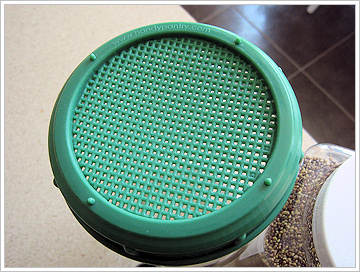
Along with the lid, I went ahead and purchased some organic Red Clover seeds for sprouting. I chose them over alfalfa sprouts for the benefits they have, and also, to try something different from the more common alfalfa sprouts I'm accustomed to eating in club sandwiches and the like.
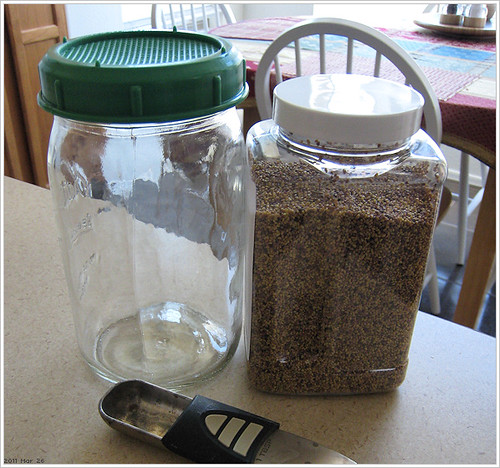
Here is my wide mouth, quart-sized mason jar with the sprout straining lid on it. To the right is 1 lb. of organic red clover seeds and you can also see my measuring spoon there.
Early morning on day 1 of sprout growing, I put two level tablespoons of seeds into the mason jar, swished some water around to rinse the seeds, and then drained the water. After rinsing, I added water to the jar again to fill 3/4 of it and let the seeds soak for about 12 hours.
After 12 hours before I went to bed, I dumped the water and left the jar upside down to let any excess water drain.
In the morning I filled the jar with water just enough to get the seeds moist, drained the water, and then layed the jar on its side with a towel over it. I did this once in the morning and once again before bed-time.
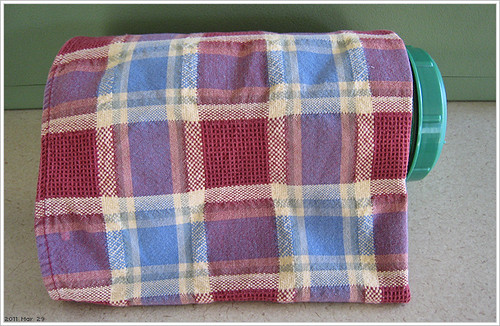
This photo was taken on day 3. I kept mine covered with a dish towel to prevent them from producing chlorophyll until I was ready for them to. (That is a personal preference.) The sprouts don't need light to grow.
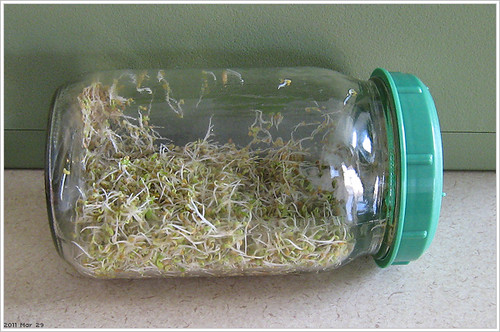
With the towel taken off of the jar on day 3, you can see the result here where they are starting to get busy doing what sprouts do: sprout! tee hee!
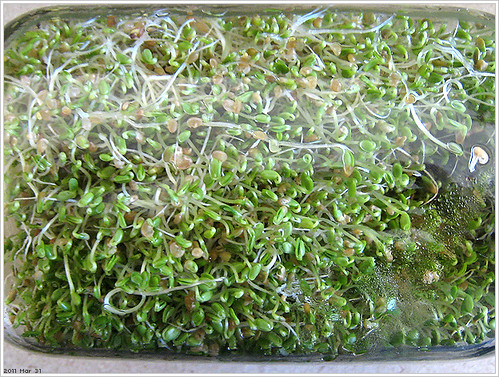
This photo was taken on day 5. But on day 4, I took the towel off to let them get light and start producing some chlorophyll and this photo is the result of that. For me, I wanted to have the benefit of the nutrients that are produced in sprouts that have chlorophyll and also some that do not have chlorophyll in them. This is why I kept them covered and waited until they were almost ready to be stored. In the photo above that's the "green" side.
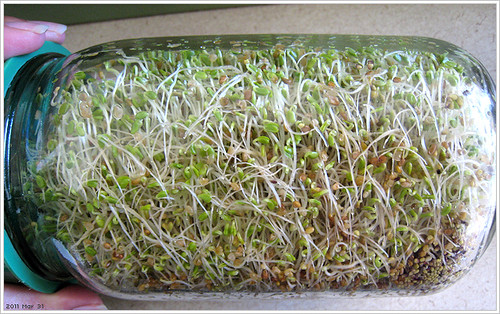
This is the "yellow" side where the sprouts have not fully matured in sunlight. There is a better photo of this once they come out of the jar.
After removing the sprouts from the jar, oh boy did it smell so great! I love the earthy grassy smell of things like these sprouts and tomatoes and things like that. Adorable! lol. Plant sprouts have a scent that makes my brain go squeeeee!
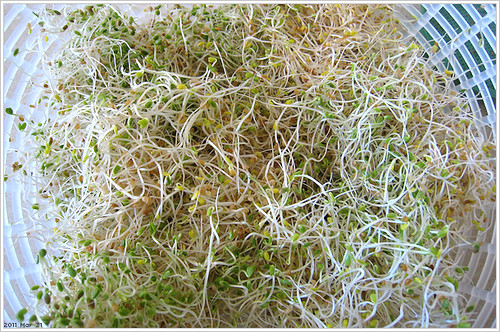
I carefully separated the mat of sprouts and put them in my salad spinner. You can see the patches of green in there with what look like patches of not-green. Now it is time for de-hulling:
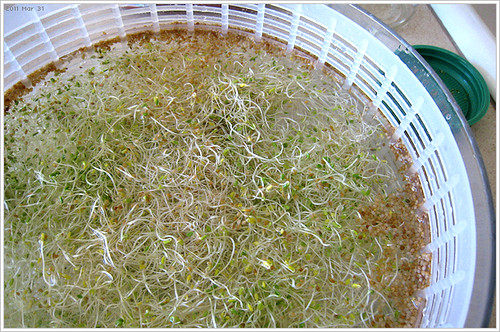
While the sprouts are in the bowl they are submerged in water. The hulls of the seeds float to the top and can be dumped out. In the photo above you can see along the edges of my bowl they have floated up.
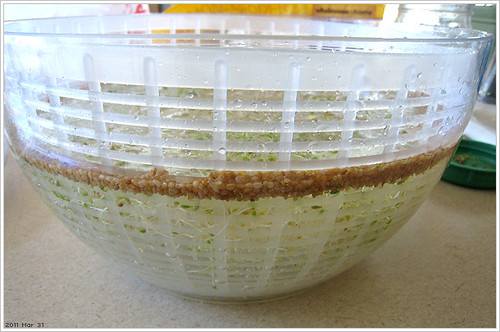
This is what it looked like from the side. The salad spinner was super nice to use and was recommended in a video I watched (different from the one I linked below) because I could pull out the colander and dump the casings with ease.
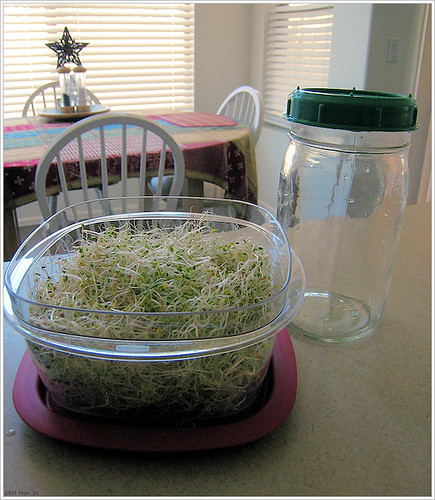
After de-hulling, my sprouts went for a really good spin in the salad spinner. Removing excess water is vital for them to remain edible for longer. Excessive moisture will cause them to rot more rapidly.
The amount I ended up storing in my Tupperware was more than expected. I don't have a weigh scale, but it is a lot of sprouts. I don't know what I'm going to do with all these sprouts in the next week. LOL.
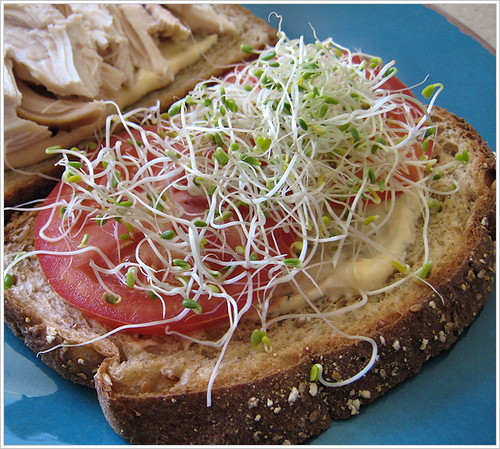
For lunch I made sandwiches and it only took a tiny bit of sprouts to flavor the sandwich using them as an alternative to lettuce.
I ended up adding another couple of pinches of sprouts to a spring mix garden salad at dinnertime. Tomorrow for lunch, more sandwiches with a pinch of sprouts!
I will be trying mung bean sprouts when I get some seeds for them. Those are the ones that are often mixed into Asian stir fry. I am quite sure I'll use those fairly often.
Here is a video that shows how super easy it is to do this if you aren't already familiar:
The YouTube Video:
Nutritional Info for Red Clover Sprouts: (trifolium pratense)
Vitamins A, B, C, E and K
Calcium, Iron, Magnesium, Phosphorus, Potassium, Zinc
Carotene, Chlorophyll, Amino Acids, Trace Elements
Protein: 35%
Blood cleanser, alterative, diuretic, nervine, tonic, expectorant, demulcent, mildly laxative, mildly antispasmodic; positively affects blood circulation. Containts phyto-estrogens.
Disclaimer:
There are stories out there of how sprouts can be bad for you. The reality is; it is similarly as difficult to 'overdose' on the canavanine in sprouts as it is to die from an overdose of caffeine by drinking coffee. Canavanine is antibacterial, antiviral, antifungal, antiviral and antineoplastic. (Atineoplastics are used in chemotherapy to kill cancer cells.) The amino acid found in red clover is in much smaller quantities than alfalfa sprouts. Sprouts do not cause cancer, and do not cure it, but can assist with fighting it, and for use as a preventive for those with higher risk.
Like anything taken in large and excessively large amounts, sprouts contain something in them that can cause inflammation There are circumstances which contraindicate the ingestion of any kind of sprouts for people medically diagnosed with auto-immune and inflammatory diseases, anyone using blood thinners such as warfarin and for women who are pregnant.
Happy sprouting!


ReplyDeleteDear: Herbalogue,
I was searching for sprouting companies and sprout seed suppliers online and ran across your website. By the way, it is a very nice website.
My name is Alain Edel, and I am the newest addition to the ISS sales team.
ISS is located in Cookeville, TN.
We have large and small customers all over the world and provide a number of different services to them. When you have some free time, please visit our website at www.sproutnet.com . We have had this website for many years and I’m excited to report that our new website is on the way. It should be finished in the next 60 days. I will send you another note then and give you the exact address so that you can check it out!
I would love to learn more about your company and see if there is anything that ISS can help you with. We have a seed list available and information on sprouting equipment, if you are interested?
Respectfully,
Alain
Alain Edel Sanchez
ISS Sales Consultant
International Specialty Supply
Phone: 931-284-4623 ext. 116
Fax: 931-526-8338
E-mail: alain@sproutnet.com
www.sproutnet.com